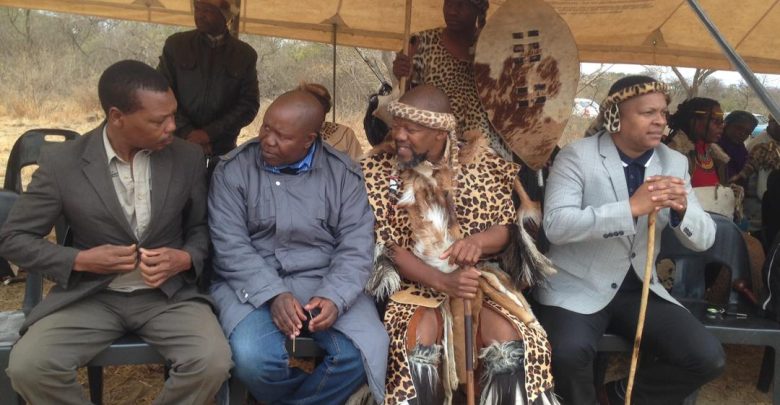Chiefs must be held in high esteem, not jailed: Xhosa Prince

A Prince in the Xhosa dynasty and one of the elders in the Zimbabwean Xhosa community, Isolengwe Tshawe, has spoken out against the arrest of Ntabazinduna Chief Nhlanhla Ndiweni, saying his incarceration was an attack on the institution of traditional leaders.
Chief Ndiweni was sentenced to 18 months in prison on malicious damage to property charges after he and other villagers destroyed a fence of a villager who had defied him.
However, Chief Ndiweni is out on ZW$500 bail pending appeal.
Speaking at the King Mzilikazi Commemorations held at Mhlahlandlela Saturday, Guest of Honour, Prince Tshawe of Mbembesi, said that besides rural communities in Zimbabwe, everyone regardless of office must have great respect for traditional leaders and treat them with considerable esteem.
“The chief’s legitimacy to govern and preside over disputes is derived from tradition and culture. But if the state deemed there was an issue with the chief’s ruling, there are other channels that could have been explored instead of sentencing him to jail,” the prince said.
Prince Tshawe comes from the House of Sigcawu and represents the South Africa-based Xhosa King Zwelonke Sigcawu in Zimbabwe.
He is the direct link between King Sigcawu and the Xhosa people in the country.
Prince Tshawe emphasised that respect for chiefs was even more entrenched when the communities respected traditional norms and ways.
On that note, the Xhosa elder denounced the state for dragging Chief Ndiweni to jail without exploring other avenues yet the institution of traditional leadership was also a governance structure.
Prince Tshawe noted that an incarceration of a chief would not be tolerated among the Xhosa as they valued the input of traditional leaders.
“Our chiefs must be respected and we don’t understand why in this instance, the chief was arrested when he had presided over a matter that was before him. Why imprison chiefs without having spoken to them first? What treatment is that?” he asked.
The cultural advocate said: “We as the Xhosa believe in communication and in such instances, when something was seen to be wrong, the minister of local government should have communicated with the chief.
“If these two fail to solve the matter, the matter can be taken up the hierarchy and reach the president instead of sending a chief to prison. He was not supposed to in jail.”
Prince Tshawe said the Xhosa believed in peaceful solutions and that is how they handled matters.
“You cannot disrespect a chief in that manner, because even the president himself comes from the people,” he said.
The prince also wondered why authorities were against the installation of a Ndebele king, when the history of the country was founded from a monarch founded by King Mzilikazi.
“We don’t understand why this is so. Bulawayo is known as the City of Kings and Queens but that is not implemented. Where is the challenge? As the name suggests, City of Kings, there must be a king in place and that will has to be done immediately,” urged Prince Tshawe.
He also called upon the business community to assist in the rehabilitation of Mhlahlandlela as the place is host to the grave of King Mzilikazi, founder of the Ndebele nation.
“We spoke of having ablution services and infrastructure but this hasn’t been done. Businesses and other interested parties must assist in setting this place up,” Price Tshawe said.
The prince said there was need for the Ndebele nation to engage local authorities so that they fix the road that leads to Mhlahlandlela.
Mhlahlandela is 22km away from Bulawayo using Old Gwanda road but the bad patch of the road makes the journey ardous.
“This road must be fixed as a matter of urgency. District councils or the relevant authorities must make sure this road is rehabilitated in honour of the late, King Mzilikazi,” Prince Tshawe said.






